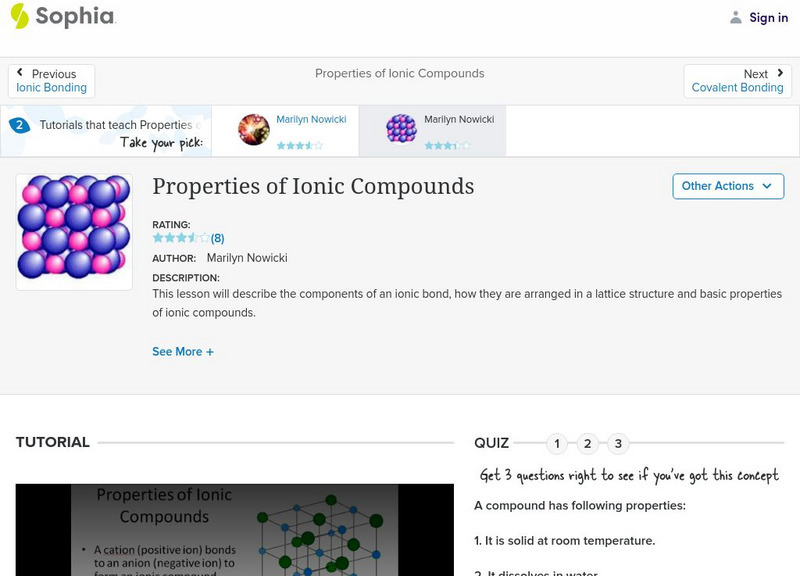Crash Course
Water and Solutions -- for Dirty Laundry: Crash Course Chemistry
Dihydrogen monoxide (better know as water) is the key to nearly everything. It falls from the sky, makes up 60% of our bodies, and just about every chemical process related to life takes place with it or in it. Without it, none of the...
Curated Video
Dissociate
To break apart an ionic compound into its constituent ions. A Twig Science Glossary Film. Key scientific terms defined in just 60 seconds using stunning images and concise textual definitions. Twig Science Glossary Films reinforce...
FuseSchool
What Is The Bronsted Lowry Theory
Have you ever head of the Bronsted Lowry Theory of acids and bases, an essential theory of Chemistry? It helps you fill the gaps in the Arrhenius theory. This education video by the Virtual School will teach you about: - Testing acids -...
FuseSchool
What Makes Things Alkali?
Learn the basics about What makes things alkali? How is alkali recognized? What are alkali chemical properties? Find out more in this video!
Catalyst University
The Chelate Effect Makes Complexes More Stable
The Chelate Effect Makes Complexes More Stable
Professor Dave Explains
What Are Electrolytes?
People throw around the term "electrolyte" quite a bit, but what does it mean? What makes something a strong electrolyte, a weak electrolyte, or a nonelectrolyte? let's find out!
Professor Dave Explains
Complex Ion Formation
Most transition metal cations can do something interesting in solution, they can interact with specific ligands to form complex ions. These coordinate covalent bonds are new territory, so let's get a mini introduction to inorganic...
FuseSchool
Strong and Weak Alkali's
An acid is a substance that will dissociate in water to give a proton (or H+ ion) and a conjugate base. An acid is considered to be strong if dissociation nears 100%, and weak if dissociation is usually less than 1%. In this lesson, we...
FuseSchool
Properties of Ionic Substances
Learn the basics about properties of ionic substances as a part of ionic bonding within properties of matter.
FuseSchool
Ionic Compounds & Their Properties
Learn the basics about Ionic Compounds, how they are formed and what their properties are.
Sophia Learning
Sophia: Electrolyte Definition: Lesson 1
This lesson will define an electrolyte. It is 1 of 2 in the series titled "Electrolyte Definition."
Sophia Learning
Sophia: Strong and Weak Electrolytes: Lesson 1
This lesson will explain that some solutes dissociate more readily than others in aqueous solutions and that the greater the ability the stronger the electrolyte. It is 1 of 2 in the series titled "Strong and Weak Electrolytes."
Sophia Learning
Sophia: Electrolyte Definition: Lesson 2
This lesson will define an electrolyte. It is 2 of 2 in the series titled "Electrolyte Definition."
Sophia Learning
Sophia: Properties of Ionic Compounds: Lesson 2
This lesson will describe the components of an ionic bond, how they are arranged in a lattice structure and basic properties of ionic compounds. It is 2 of 2 in the series titled "Properties of Ionic Compounds."
Sophia Learning
Sophia: Properties of Ionic Compounds: Lesson 1
This lesson will describe the components of an ionic bond, how they are arranged in a lattice structure and basic properties of ionic compounds. It is 1 of 2 in the series titled "Properties of Ionic Compounds."
Sophia Learning
Sophia: Strong and Weak Electrolytes: Lesson 2
This lesson will explain that some solutes dissociate more readily than others in aqueous solutions and that the greater the ability the stronger the electrolyte. It is 2 of 2 in the series titled "Strong and Weak Electrolytes."






